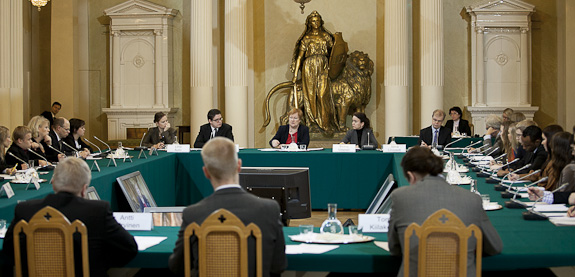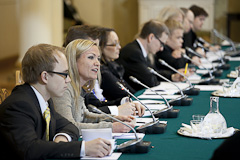The President of the Republic of Finland: Press Releases and News
News, 1/19/2012
Young people assessed Finland’s future at the Presidential Forum
 Copyright © Office of the President of the Republic of Finland
Copyright © Office of the President of the Republic of FinlandAt the Presidential Palace on 19 January 2012 young opinion-makers talked about marginalisation, the opportunities of young people for influence, and sustainable development. The 20th Presidential Forum was organised by President of the Republic Tarja Halonen under the theme “young people and the future”. Participants included representatives of political youth organisations, student associations and other non-governmental and youth organisations, as well as active opinion-makers. The event was chaired by Ville Blåfield, Development Director at Helsingin Sanomat. The debate is available as a video recording.
“Finland and the world will look different in the future in many ways. The globalising world has made us all increasingly interdependent,” said President Halonen in her opening speech. “What will our own country look like?”
Although the majority of Finnish children and young people are doing well, President Halonen said that the distribution of welfare is not equal: “The worst aspect of these problems is that they appear to accumulate, affecting those who are already in a vulnerable position. We must find ways to ensure that each new generation has equal opportunities for advancement.”
Democracy – the best in design
 Copyright © Office of the President of the Republic of Finland
Copyright © Office of the President of the Republic of FinlandAccording to Hanna-Mari Manninen, President of the Finnish Youth Cooperation Allianssi, the participation of young people in democratic decision-making is a way of guaranteeing that the future belongs to everyone, both young and old. “We need to make youth-based democracy the best design Finland has to offer,” she said. There are no issues that do not concern young people. “Access to decision-making by young people takes place through schools. This is why we must bring politics back into schools,” said Manninen in her introduction.
The discussions revealed that marginalisation and opportunities for influence are in fact two sides of the same coin. Tuomas Tuure from the Threshold Association stressed that young people should not be viewed as a monolith. The disabled are among those minorities who struggle most to get their voice heard. Antti Kurvinen, chairman of the Finnish Centre Youth, drew particular attention to the problems encountered by young men, both among immigrants and in rural areas.
Young people have work experience
How do we reach those young people who have been marginalised? This was the question posed by researcher Tomi Kiilakoski from the Finnish Youth Research Society. As a rule, studies relating to young people only reach those young people who are better off. Executive Director Johanna Seppälä from child welfare association Aseman Lapset ry said that those who have been marginalised might not even be interested in having a say, but that they, too, can be reached. “You need to get out of the youth centres; we know where young people move.”
Veera Svahn, who chairs the association of upper secondary school students (Suomen Lukiolaisten Liitto), pointed out that young people have an extremely positive outlook towards the future. Only ten per cent of upper secondary school students have no work experience whatsoever. “This was a positive surprise even for us.”
New indicators
President Halonen also talked of the work of the UN High-level Panel on Global Sustainability. “Economic growth needs to be socially equitable and to take account of the environment.” When assessing sustainable development, indicators based on the economy alone, such as GDP, are insufficient, President Halonen said. Economic indicators must be accompanied by ones relating to social equitability and the environment.
Secretary general Leo Stranius from environmental protection association Luonto-Liitto listed some of the issues that we must balance among: “Consumption, conservation, preservation?” Stranius said that society must be ready to accept that economic growth is not perpetual.
Presidential Forums have been arranged since 2006 at the initiative of President Halonen. Themes on previous occasions have included Finnish labour competitiveness, expertise and innovations, foreign policy, care for the elderly, the Baltic Sea, tolerance, municipal services, the “silent years” in Finnish history, Finland in the face of change, fundamental and human rights, jobs and unemployment, climate change, family violence, globalisation and the UN Millennium Development Goals, peacekeeping and crisis management, the Arctic region, sustainable development, culture, and the state of Europe and the world.
About this site webmaster[at]tpk.fi



